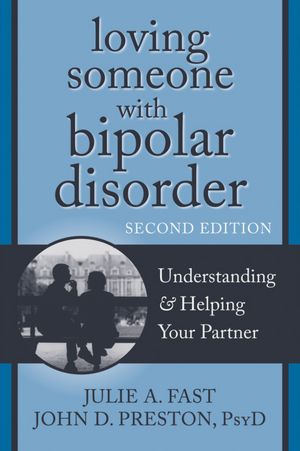Chronic Illness & Dating Part 2: Review of Loving Someone With Bipolar Disorder

In honor of Valentine’s Day, I’m doing a series on chronic illness and dating. In the previous post, guest blogger Emily (who has Cystic Fibrosis) told us about how she found love despite her health problems. This article is about navigating a relationships when your partner has bipolar disorder. I’m reviewing an excellent book called Loving Someone with Bipolar Disorder (2ND Ed. By Juile A. Fast and John Dr. Preston, PsyD). Fast and Preston’s book is one of the best books I’ve ever read about bipolar disorder.This is a great resource for anyone who is in a relationship with someone who has bipolar disorder, whether that person is stable or in the midst of a bipolar crisis. This book is also enlightening for people with bipolar disorder because it helps you understand what your partner feels like. It shows you what it’s like to live with someone who has a mental illness. If you have this illness and wish your partner could understand what you feel like, share this resource with your significant other.
The testimonials provide honest insiders’ perspectives from both viewpoints-the person with bipolar and his/her significant other. Loving Someone with Bipolar Disorder is insightful and never dull—it’s filled with examples, testimonials, and step-by-step exercises. I’m not going to delve into every lesson I learned. I’ll just give you a few highlights.
WHAT YOU CAN LEARN FROM THIS BOOK:
1. How to identify your partners triggers—triggers are situations, events, or behaviors that lead to depression, mania, psychosis, and anxiety. By knowing your partner’s triggers, you can modify or prevent triggers from happening. (I previously defined the concept of triggers in this post, Mental Illness: Do You Know What Your Triggers Are? and explored them further in Bipolar Disorder: 3 Tips for Making Mood Charts Work.)
2. How to recognize symptoms in different areas of your partners’ life including: school/work, relationships with others, sleep, medications, and sex.
3. How to create a “Holistic Treatment Plan”—the book walks you through this step-by-step and helps you put a plan into place so you and your partner can tackle mood swings head on before they become out of control. With this plan, you can prevent future symptoms such as hypersexuality or manic spending sprees.
4. How to have difficult conversations about sticky topics—such as how to talk to your partner about money or how to talk to your partner’s family if they are against treatment. If you have children, this book also discusses how to talk to your kids about your partner’s illness. I love the scripts Fast and Preston provide for initiating these difficult, but necessary, conversations.
5. How to take care of and protect yourself—as an example, the book has solutions for protecting your finances and credit score if your partner has manic spending sprees. The book also has ideas for managing the stress you may be feeling as a caretaker.
RESPOND TO BIPOLAR DISORDER; DON’T REACT TO YOUR PARTNER
The biggest takeaway I got from the book is that when a couple is having a “Bipolar Conversation,” such as an argument caused by a mood swing, it’s better to respond to the bipolar disorder instead of reacting to your partner. Fast gives dozens of examples of bipolar conversations that can take place during episodes of depression, mania, paranoid depression, and anger and irritation. Fast and Preston say that when someone is in the middle of a mood swing, he/she is not thinking rationally and it’s extremely counterproductive to react out of your own justifiable anger or sadness. Instead, one should respond to the illness—not react to the partner. Learning how to do this takes time. Thankfully, the authors provide exercises to help readers learn how to respond effectively. Learning how to stop a bipolar conversation or even prevent it from happening (by recognizing the leading comments listed by Fast and Preston) can go a long way in keeping a mood swing from getting out of control. Equally important, handling bipolar conversations well can save your relationship.
YOUR TURN?
How does illness affect your relationships? What advice would you give others? This is a subject Fashionably ill readers have been exploring on Facebook. Like us at: https://www.facebook.com/fashionablyill
–Your Stylist, Jessica Gimeno






